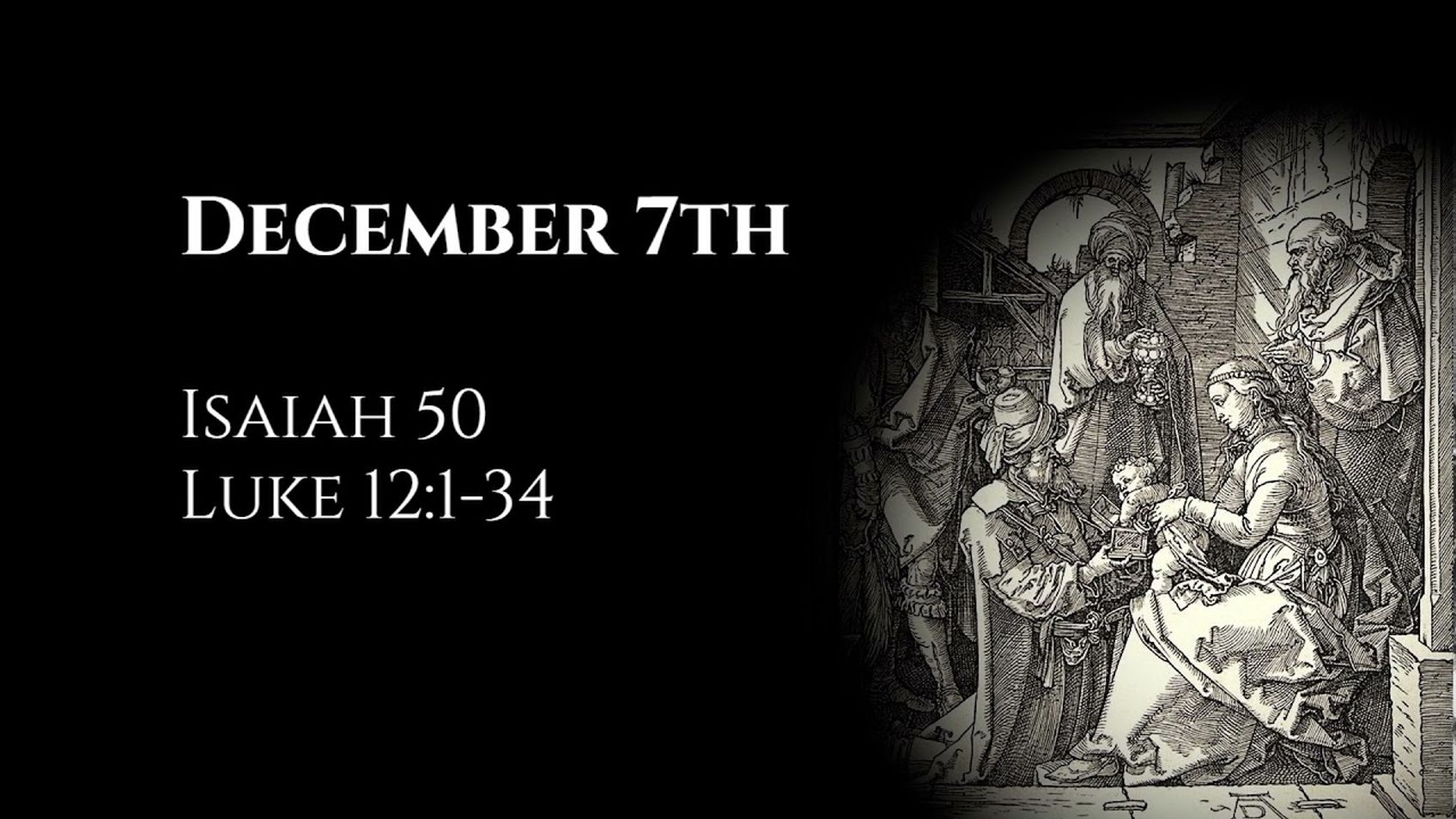December 7th: Isaiah 50 & Luke 12:1-34
December 6, 2021

Alastair Roberts
The Servant's faithfulness in suffering and confidence in vindication. Jesus teaches the multitude.
My reflections are searchable by Bible chapter here: https://audio.alastairadversaria.com/explore/.
If you are interested in supporting this project, please consider supporting my work on Patreon (https://www.patreon.com/zugzwanged), using my PayPal account (https://bit.ly/2RLaUcB), or buying books for my research on Amazon (https://www.amazon.co.uk/hz/wishlist/ls/36WVSWCK4X33O?ref_=wl_share).
You can also listen to the audio of these episodes on iTunes: https://itunes.apple.com/gb/podcast/alastairs-adversaria/id1416351035?mt=2.
More From Alastair Roberts
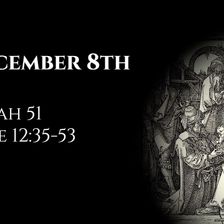
December 8th: Isaiah 51 & Luke 12:35-53
Alastair Roberts
December 7, 2021
The Lord, the comforter of Zion. Being prepared for the coming of the Son of Man.
My reflections are searchable by Bible chapter here: https://audio.
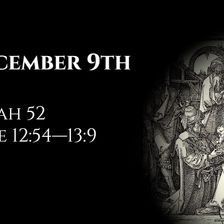
December 9th: Isaiah 52 & Luke 12:54—13:9
Alastair Roberts
December 8, 2021
How beautiful upon the mountains are the feet of him who brings good news. Knowing the times.
My reflections are searchable by Bible chapter here: ht
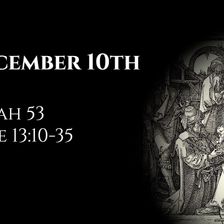
December 10th: Isaiah 53 & Luke 13:10-35
Alastair Roberts
December 9, 2021
The suffering Servant. Parables of Leaven and Mustard Seed and lament over Jerusalem.
My reflections are searchable by Bible chapter here: https://au
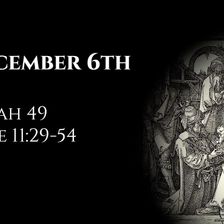
December 6th: Isaiah 49 & Luke 11:29-54
Alastair Roberts
December 5, 2021
The servant of the Lord, the Lord's salvation to the ends of the earth. Woes upon the Pharisees and lawyers.
My reflections are searchable by Bible c
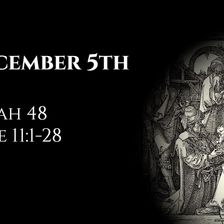
December 5th: Isaiah 48 & Luke 11:1-28
Alastair Roberts
December 4, 2021
Listen to me, O Jacob! The Lord's Prayer.
My reflections are searchable by Bible chapter here: https://audio.alastairadversaria.com/explore/.
If you
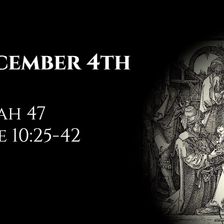
December 4th: Isaiah 47 & Luke 10:25-42
Alastair Roberts
December 3, 2021
The humbling of the proud virgin of Babylon. The Parable of the Good Samaritan.
My reflections are searchable by Bible chapter here: https://audio.al
More on OpenTheo

The Man on the Middle Cross with Alistair Begg
Life and Books and Everything
November 10, 2025
If you haven’t seen the viral clip, go see it right now. In this episode, Kevin talks to Alistair about the preaching clip he didn’t intend to give, h

Prove to Me That Jesus Is Not a Created Being
#STRask
January 26, 2026
Questions about why we should think Jesus is not a created being, and what it means to say God became fully human if part of being human means not bei

Why Is It Necessary to Believe Jesus Is God?
#STRask
February 19, 2026
Questions about why it’s necessary to believe Jesus is God, whether belief in the Trinity is required for salvation, and why one has to believe in the

What Are Some Good Ways to Start a Conversation About God with Family Members?
#STRask
October 30, 2025
Questions about how to start a conversation about God with non-Christian family members, how to keep from becoming emotional when discussing faith iss

Lora Ries: Border Security and Immigration Policy
Knight & Rose Show
December 7, 2025
Wintery Knight and Desert Rose welcome Lora Ries to discuss border security and immigration policy. They explore Biden's policy changes, like ending R

Is 1 Corinthians 12:3 a Black-and-White Tool for Discernment?
#STRask
October 27, 2025
Questions about whether the claim in 1 Corinthians that “no one can say ‘Jesus is Lord’ except in the Holy Spirit” is a black-and-white tool for disce

How Do You Justify Calling Jesus the Messiah?
#STRask
December 18, 2025
Questions about how one can justify calling Jesus the Messiah when he didn’t fulfill the Hebrew messianic prophecies, and whether the reason for the v

What About Those Who Never Heard the Name of Jesus?
#STRask
December 22, 2025
Questions about what will happen to those who never heard of Jesus or were brought up in a different faith, whether there’s biblical warrant to think

Is It Possible There’s a Being That’s Greater Than God?
#STRask
February 5, 2026
Questions about whether it’s possible there’s a being that’s greater than God and that’s outside of God’s comprehension and omniscience, and how to ex

The Heidelberg Catechism with R. Scott Clark
Life and Books and Everything
November 3, 2025
You may not think you need 1,000 pages on the Heidelberg Catechism, but you do! R. Scott Clark, professor at Westminster Seminary California, has writ

What Tools of Reasoning Help You Know What’s True, Right, and Good?
#STRask
December 4, 2025
Question about what tools of reasoning help us determine whether something is true or false, right or wrong, good or bad before bringing Scripture int

Does Open-Mindedness Require Studying Other Religions Before Becoming a Christian?
#STRask
February 9, 2026
Questions about the claim that if Christians really want to be open-minded, they need to read and study other religions before committing to Christian

The Making of the American Mind with Matthew Spalding
Life and Books and Everything
February 2, 2026
The United States is unique in how much attention it pays to its founding, its founders, and its founding documents. Arguably, the most famous and mos

Does God Really Need a “Pound of Flesh” to Forgive Sins?
#STRask
January 12, 2026
Questions about how to answer the challenge that God doesn’t need a “pound of flesh” to forgive sins but can simply forgive, and whether the claim in

Keri Ingraham: School Choice and Education Reform
Knight & Rose Show
January 24, 2026
Wintery Knight and guest host Bonnie welcome Dr. Keri Ingraham to discuss school choice and education reform. They discuss the public school monopoly'
